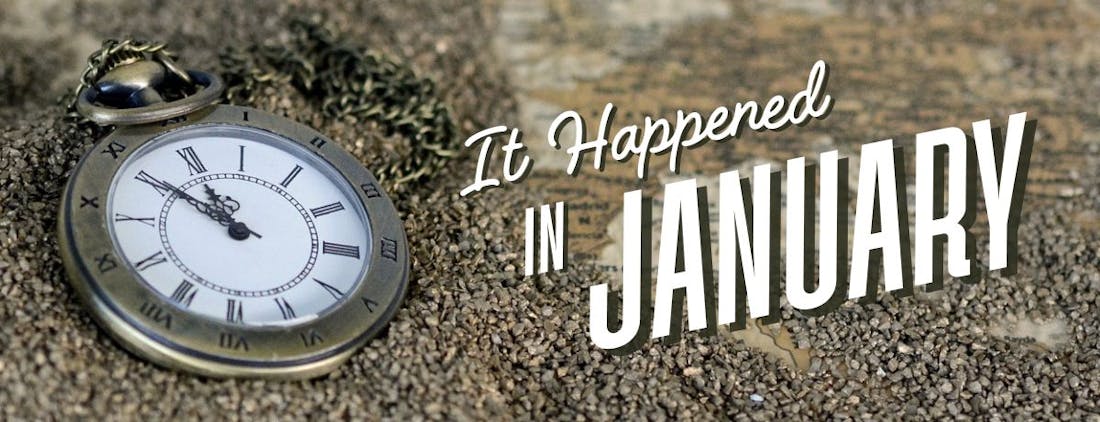
View Historical Events by Day: What Happened on January 10 in History?
Explore the historical events that shaped our world on January 10th. From major milestones to cultural achievements, see what happened on this day in history. Dates for earlier events may be approximate.
Note: Sources for the historical content shown, include research and reviews of relevant Online History Resources or printed material. When possible, we show a link to a source which provides additional or unique perspective about the event.
We do our best to provide accurate information but would appreciate being notified if any incorrect information is found. You may do so by using our Feedback link.
Julius Caesar, defying the order of the Roman Senate not to so, crosses the Rubicon River with his legion, famously uttering "alea iacta est" meaning "the die has been cast" and leading to the Roman Civil War. He was assassinated in 44 BCE.
Cleopatra VII of Egypt declares her son co-ruler as Ptolemy XV Caesarion with her.
Theodosius II becomes co-emperor of the Eastern Roman Empire at the age of seven.
The Council of Clermont begins, where Pope Urban II delivers a sermon urging Christians to reclaim the Holy Land, sparking the First Crusade.
Pope Alexander III issues the papal bull "Manifestis Probatum," recognizing Portugal as an independent kingdom.
King Rudolf I of Germany grants the Privilegium Majus, a document asserting the independence of Austria.
The Battle of Emesa takes place during the Byzantine civil war between factions led by Andronikos III and John Kantakouzenos.
A truce is agreed upon between England and Scotland during the Second War of Scottish Independence.
Philip VI of France creates a naval blockade against English wool exports in retaliation for the Hundred Years' War.
The St. Scholastica Day riot occurs in Oxford, England, resulting in significant violence between town and gown.
Portuguese forces under Nuno Álvares Pereira defeat Castilian forces at the Battle of Trancoso.
The Welsh rebel leader, Owain Glyndŵr, proclaims himself Prince of Wales, initiating a revolt against English rule.
The Battle of San Romano takes place between Florence and Siena, a conflict depicted in famous Renaissance artworks.
Alfonso V of Aragon reconquers Naples from the Angevins, establishing Aragonese rule in southern Italy.
Richard, Duke of York, is proclaimed King of England, challenging the reign of King Henry VI during the Wars of the Roses.
The Treaty of Westminster is signed between England and Scotland, securing peace between the two kingdoms.
The Battle of Harlaw in Scotland sees the victory of the Scottish over the Highland clans.
Henry VIII declares himself head of the Church in England, formally separating from the Roman Catholic Church.
The Council of Trent reconvenes in Trento, Italy, to discuss reforms in response to the Protestant Reformation.
Spain's King Philip II revokes William the Silent's amnesty, renewing hostilities in the Dutch Revolt.
The Treaty of Paris ends the Seven Years' War, redistributing territories and marking significant colonial changes.
Thomas Paine publishes "Common Sense," advocating American independence from Britain. More
The first freight train is introduced in the United States, operating in Quincy, Massachusetts.
The Great Eastern ship is launched in England, designed by Isambard Kingdom Brunel.
The Pemberton Mill in Lawrence, Massachusetts, collapses, resulting in the death of over 145 workers.
Crazy Horse and his warriors fight their last battle against the U.S. Cavalry at Wolf Mountain, Montana. More
The Salvation Army begins operations in the United States.
The Lucas Gusher at Spindletop, just south of Beaumont, Texas, blew a stream of oil over 100 feet high until it was capped nine days later and flowed an estimated 100,000 barrels a day. It was found at a depth of 1,139 feet and it herald the beginning of the American Oil era. While some made fortunes, others lost everything. More
The British SS Valencia runs aground off Vancouver Island, resulting in over 100 deaths.
The Professional Golfers' Association of America (PGA) is established in New York City.
The League of Nations officially comes into existence holding its first council meeting in Paris. On November 15, 1920, 41 members states, representing more than 70% of the world’s population, gathered in Geneva for the opening of the first session of the Assembly. More
The Irish War of Independence begins as Irish guerrillas attack and burn down the Custom House in Dublin.
U.S. President Harding issues an executive order halting U.S. occupation of the Rhine allowing the return of the final contingent of American troops to return home, more than four years after the end of World War I.
The Soviet Union orders the exile of Leon Trotsky.
The United Nations convened the First Session of the General Assembly in London, England. Delegates representing 51 nations attended the session, wherein the scope and purpose of the United Nations was defined. More






.png?auto=format,compress&fit=crop&w=280&h=280&q=93)







.jpg?format,compress&fit=crop&w=280&h=280&q=93)
.jpg?format,compress&fit=crop&w=280&h=280&q=93)












